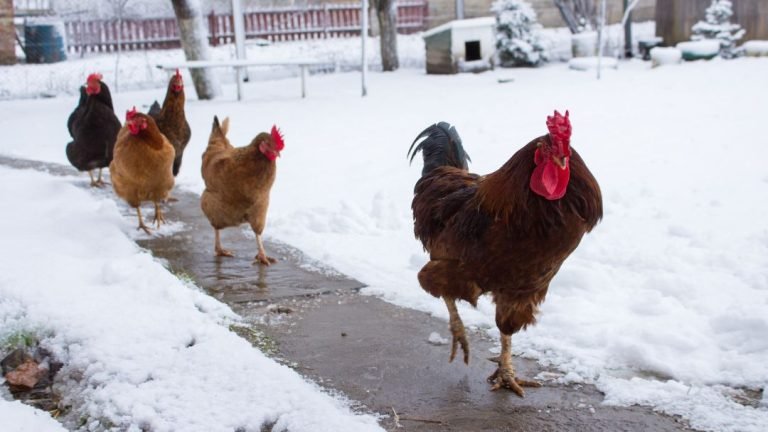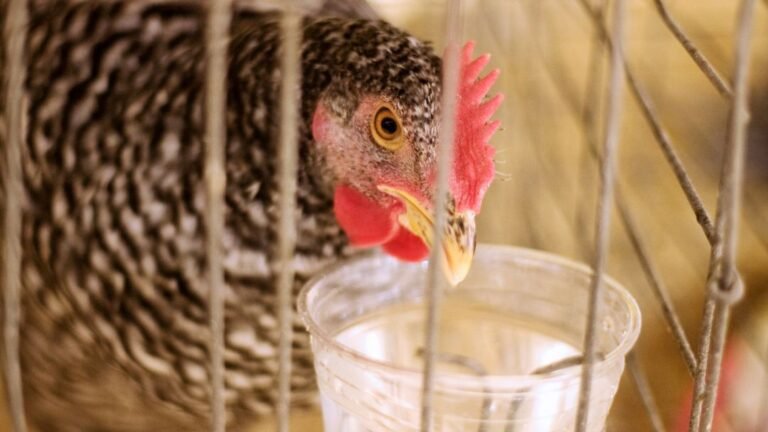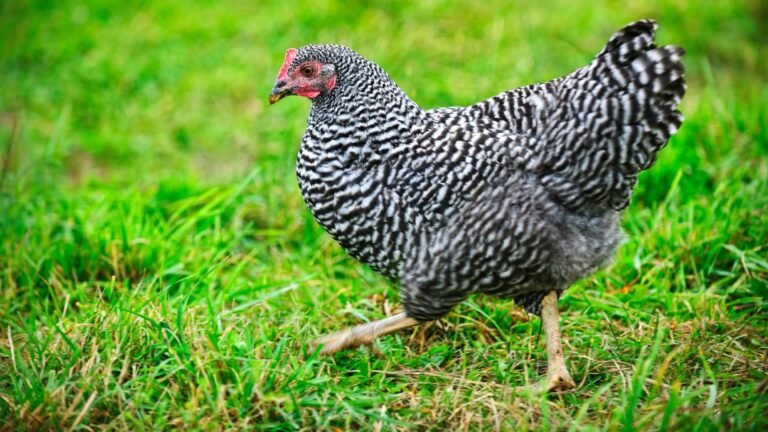Chickens typically live for 5 to 10 years. Chickens have a relatively short lifespan compared to other animals, with an average lifespan of 5 to 10 years.
While some chickens may live longer, factors such as breed, health, and living conditions can affect their lifespan. Chickens are popular poultry animals that are raised for their meat, eggs, and as pets. Understanding their lifespan can help chicken owners make informed decisions about their care and provide them with a healthy and fulfilling life.
We will explore the factors that can affect a chicken’s lifespan and provide tips on how to extend their life expectancy. Whether you are a farmer, homesteader, or backyard chicken enthusiast, knowing how long chickens live is essential knowledge for their overall well-being.
Understanding The Lifespan Of Chickens
Understanding the Lifespan of ChickensWhen it comes to keeping chickens as pets or for their eggs, it’s essential to have a good understanding of their lifespan. Knowing how long chickens live can help you provide the best care and make informed decisions about raising and breeding these feathered friends. There are several factors that can impact the lifespan of chickens, including genetic factors, breeding practices, environmental conditions, and nutrition and healthcare.Factors That Affect The Lifespan Of Chickens
1. Genetic factors: A chicken’s genetics can play a significant role in determining its lifespan. Different breeds have different lifespans, with some living longer than others. For instance, heritage breeds like Rhode Island Reds and Plymouth Rocks tend to have a longer lifespan compared to commercial hybrid breeds. It’s important to research and choose breeds known for their longevity if you want your chickens to live a full and healthy life.2. Breeding practices: Breeding practices can also influence the lifespan of chickens. Backyard breeders who prioritize health and vitality when selecting breeding stock are more likely to produce chickens with a longer lifespan. Breeding from parent chickens that have survived and thrived without significant health issues can increase the chances of offspring inheriting good genes and enjoying a longer lifespan.3. Environmental conditions: The environment in which chickens are raised can greatly impact their lifespan. Chickens that are exposed to extreme temperatures, harsh weather conditions, or confined spaces may have a shorter lifespan compared to those living in more favorable surroundings. Providing a clean and comfortable living environment that accommodates their natural behavior can help promote good health and longevity.4. Nutrition and healthcare: Proper nutrition and healthcare are vital components of ensuring the longevity of chickens. A balanced diet that includes appropriate amounts of protein, grains, fruits, and vegetables can keep chickens healthy and extend their lifespan. Regular access to clean water is also crucial. Additionally, routine healthcare practices such as vaccinations, parasite control, and regular check-ups from a qualified veterinarian can help identify and prevent potential health issues that may shorten a chicken’s life.In conclusion, understanding the lifespan of chickens is essential for anyone considering raising these birds. Genetic factors, breeding practices, environmental conditions, and nutrition and healthcare all play a role in determining how long chickens live. By taking these factors into account and providing appropriate care, you can help ensure that your chickens thrive and enjoy a long and happy life on your farm or in your backyard. So, take the time to learn about the specific needs of your breed, create a healthy environment, and provide good nutrition and healthcare – your chickens will thank you with many years of clucks and eggs.Typical Lifespan Of Chickens
Curious about how long chickens live? Look no further! In this article, we will explore the typical lifespan of chickens, the variations in lifespan based on breed, and the impact of gender on their overall lifespan. Whether you are a backyard chicken enthusiast or considering raising chickens for commercial purposes, understanding their lifespan can help you make informed decisions and provide them with the best care possible. Let’s dive in!
The Average Lifespan Of Chickens
On average, chickens have a lifespan that ranges from 5 to 10 years, depending on various factors. While some chickens may live beyond 10 years, it is important to note that their lifespan can be influenced by genetic factors, environmental conditions, and overall health maintenance. Proper nutrition, adequate shelter, and regular veterinary care play significant roles in ensuring the longevity of your feathered friends.
Variations In Lifespan Based On Breed
Just like with any other species, different chicken breeds have varied lifespans. Some breeds are known for their longer lifespan, while others are considered shorter-lived. Here are a few examples of chicken breeds and their average lifespans:
| Chicken Breed | Average Lifespan |
|---|---|
| Rhode Island Red | 5-8 years |
| Wyandotte | 6-9 years |
| Sussex | 8-10 years |
| Leghorn | 4-6 years |
These figures are rough estimates and can vary depending on individual circumstances. If you have a specific breed in mind, it is always a good idea to research and consult with experienced chicken owners or breeders to gain a better understanding of their expected lifespan.
Impact Of Gender On Lifespan
Gender can also have an impact on the lifespan of chickens. In most cases, female chickens, also known as hens, tend to live longer than their male counterparts, known as roosters. This can be attributed to the differences in hormonal functions and stresses that occur during the mating and reproductive processes. Hens can generally live for 5-10 years, while roosters typically have a shorter lifespan, ranging from 3-8 years.
It’s worth noting that these figures are generalized estimates, and individual variations are possible. Factors such as genetic predisposition, diet, and overall care can also influence the lifespan of both hens and roosters.
Understanding the lifespan of chickens is essential for responsible chicken keeping. By providing a suitable environment, proper nutrition, and regular medical care, you can maximize the lifespan of your feathered companions and enjoy the rewards of having them around for many years.
Prolonging The Lifespan Of Chickens
As chicken owners, we always strive to provide the best care for our beloved feathered friends. Ensuring their longevity is a top priority, and various factors contribute to how long chickens live. By implementing effective care and management practices, providing proper nutrition and feeding, creating a suitable living environment, and ensuring regular veterinary care and vaccinations, you can significantly increase the lifespan of your chickens.
Care And Management Practices For Longevity
The care and management practices you implement for your chickens play a crucial role in their lifespan. By providing proper care, you can help prevent diseases, reduce stress, and promote overall well-being. Here are some essential care and management practices you should consider:
- Handling chickens with gentleness and patience to minimize stress
- Regularly inspecting chickens for any signs of illness or injury
- Isolating sick or injured chickens from the rest of the flock for prompt treatment and to prevent the spread of diseases
- Providing a clean and comfortable coop with adequate space for each chicken
- Allowing chickens to engage in natural behaviors such as scratching, perching, and dust-bathing
- Protecting chickens from extreme weather conditions, predators, and other potential dangers
Proper Nutrition And Feeding
Just like any living being, chickens require a balanced diet to thrive and live a long, healthy life. Providing proper nutrition and feeding is vital to ensure their well-being. Consider the following factors:
- Offering a nutritionally balanced chicken feed that is appropriate for their age and purpose (e.g., layers, broilers)
- Supplementing their diet with fresh fruits, vegetables, and kitchen scraps as treats
- Ensuring access to clean and fresh drinking water at all times
- Avoiding overfeeding or underfeeding, as both can lead to health issues
- Regularly cleaning food and water containers to maintain hygiene
Providing A Suitable Living Environment
The living environment of chickens greatly impacts their overall health and lifespan. Creating a suitable and well-maintained living space is vital. Consider the following factors:
- Providing enough space for chickens to move around comfortably and engage in natural behaviors
- Ensuring proper ventilation to prevent respiratory issues
- Using suitable bedding materials that are clean and absorbent
- Regularly cleaning the coop, removing waste, and preventing the accumulation of pathogens
- Protecting chickens from drafts, excessive heat, and humidity
Regular Veterinary Care And Vaccinations
Regular veterinary care and vaccinations are crucial for maintaining the health and well-being of your chickens. Veterinary professionals can provide guidance on various aspects and administer vaccinations that protect against common diseases. Consider the following:
- Scheduling regular check-ups with a poultry veterinarian to ensure early detection of any health issues
- Following the recommended vaccination schedule for your chickens
- Ensuring proper parasite control to prevent infestations
- Consulting with a veterinarian for any specific dietary or health-related advice
By implementing these care and management practices, providing proper nutrition, creating a suitable living environment, and ensuring regular veterinary care, you can significantly contribute to prolonging the lifespan of your chickens. Remember that each chicken is unique, and attentive care and attention go a long way in promoting their overall health and well-being.
Common Challenges To Chicken Longevity
When it comes to raising backyard chickens, it’s important to understand the common challenges that can affect their lifespan. By being aware of the diseases, health issues, and age-related ailments that chickens commonly face, you can take proactive steps to ensure the well-being and longevity of your flock. In this article, we’ll explore some of these challenges in detail.
Diseases And Health Issues That Affect The Lifespan
Chickens, just like any other living creatures, are susceptible to various diseases and health issues that can impact their overall lifespan. Identifying and managing these issues is crucial for maintaining a healthy flock. Here are some diseases and health issues commonly observed in chickens:
Respiratory Diseases
Respiratory diseases can pose a serious threat to chickens, impairing their ability to breathe properly and ultimately affecting their life expectancy. Some common respiratory diseases among chickens include:
- Infectious Bronchitis: This highly contagious viral disease affects the respiratory system of chickens.
- Mycoplasma Gallisepticum: A bacterial infection that causes respiratory distress and reduces the chicken’s lifespan.
Parasites And Pests
Parasites and pests not only cause discomfort to chickens but can also lead to serious health complications. Regularly checking and treating your flock for parasites is crucial for their longevity. Some of the parasites and pests that affect chickens are:
- Internal Parasites: Worms such as roundworms, tapeworms, and coccidia can affect the intestines and overall health of chickens.
- External Parasites: External parasites like mites and lice can cause itchiness, feather loss, anemia, and stress.
Age-related Ailments
As chickens age, they become more susceptible to age-related ailments that impact their overall lifespan. Some of the age-related ailments that chickens may face include:
- Arthritis: Gradual wear and tear on the joints can lead to arthritis in older chickens, making movement difficult and reducing their lifespan.
- Heart Disease: Chickens can develop heart disease as they age, leading to a decline in their overall health and longevity.
It’s important to note that these challenges can be mitigated through proactive measures such as maintaining good hygiene, providing proper nutrition, and regularly monitoring the health of your flock. By addressing these common challenges, you can optimize the lifespan of your chickens and ensure a happy and healthy flock for years to come.
Celebrating The Long Lives Of Chickens
Chickens, those feathered friends that grace our backyards and provide us with delicious eggs, are often underestimated in terms of their lifespan. Many people assume that chickens have short lives, but in reality, these birds can surprise us with their longevity. In this article, we will delve into the intriguing world of chicken lifespans and celebrate the incredible stories of chickens that have defied the odds and lived for much longer than expected.
Stories Of Exceptionally Long-lived Chickens
Within the world of chickens, there are several instances of birds living well beyond the average lifespan. These exceptional cases serve as a testament to the resilience and adaptability of these remarkable creatures.
One such notable chicken in history was Matilda, a Red Pyle hen from Bessemer, Alabama. Matilda lived to be an astonishing 16 years old, surpassing the typical lifespan of a chicken by nearly a decade. Her owners cared for her with love and dedication, ensuring that she received optimal nutrition, health care, and a safe living environment.
Another extraordinary story is that of Lucy, a Rhode Island Red who shattered expectations by living to the ripe old age of 14. Lucy’s longevity can be attributed to a combination of good genetics and a well-balanced diet, allowing her to thrive and bring joy to her owners for many years.
| Chicken | Lifespan | Notable Characteristics |
|---|---|---|
| Matilda | 16 years | Red Pyle hen from Alabama |
| Lucy | 14 years | Rhode Island Red with good genetics and balanced diet |
Famous Chickens With Remarkable Lifespans
Throughout history, there have been certain chickens that have gained fame for their exceptional lifespans. These feathered celebrities have become well-known for their ability to defy the natural course of life.
- Oldest Chicken: Matilda, the Red Pyle hen from Bessemer, Alabama, holds the title for the oldest chicken ever recorded, living to be 16 years old.
- Longest-Living Rooster: Ferdinand, a gorgeous Buff Orpington rooster, caught the attention of many with his impressive 12-year lifespan. His vibrant plumage and dignified presence made him an iconic figure in the chicken world.
- Queen of Longevity: In a small village in England, a Sussex hen named Henrietta reigned supreme as the longest-living chicken in the area. Henrietta lived a majestic life, reaching the age of 10 before she peacefully passed away.
Unique Cases Of Chickens Defying The Odds
Every now and then, we come across stories of chickens that defy the odds and leave us in awe of their resilience. These unique cases remind us of the incredible potential for chickens to live long and fulfilling lives.
- Surviving an Attack: Betsy, a courageous Plymouth Rock hen, miraculously survived an attack by a predatory fox. Despite sustaining injuries, she received immediate veterinary care and made a remarkable recovery, living many years beyond the incident.
- Thriving in Old Age: It is not uncommon for chickens to slow down with age, but there are exceptional cases where chickens continue to thrive. George, an Australorp rooster, spent his later years leading his flock with gusto, even as he approached the impressive age of 11.
- Longevity through Bonding: Chickens are social creatures, and their bonds with each other can contribute to their overall well-being. Clara and Daisy, two inseparable Silkie hens, spent their entire lives together, supporting and comforting each other. As a result, their lifespan exceeded expectations, as they lived to be 9 and 10 years old, respectively.
These remarkable stories of exceptionally long-lived chickens, famous birds with remarkable lifespans, and unique cases of chickens defying the odds are a testament to the resilience and adaptability of these fascinating creatures. So let us celebrate the long lives of chickens and cherish the joy, companionship, and inspiration they bring as they continue to grace our backyards and our lives.
Conclusion
Understanding the lifespan of chickens is essential for anyone considering raising these birds. By providing them with proper care and a suitable environment, chickens can live up to 5-10 years, sometimes even longer. Remember to prioritize their diet, shelter, and health to ensure a happy and long life for your feathery friends.
So, whether you want to enjoy fresh eggs or simply cherish the company of these fascinating creatures, taking care of them can be a rewarding experience in the long run.



